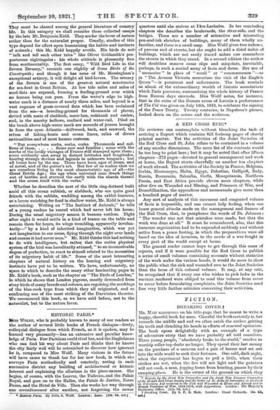A RED CROSS EPIC.* No reviewer can contemplate without blenching
the task of noticing a Report which contains 823 foolscap pages of closely printed matter. Yet the activities of the Joint Societies of the Rod Cross and St. John refuse to bo contained in a volume of any smaller dimensions. The more list of the contents would be too long to print hero ; but it may be noted that after fifteen chapters-273 pages—devoted to general management and work at home, the Report starts cheerfully on another ten chapters of work abroad. The activities of the Society in France, Belgium, Serbia, Montenegro, Malta, Egypt, Palestine, Gallipoli, Italy, Russia, Roumania, Salonika, Corfu, Mesopotamia, Northern Persia, and East Africa provide eleven more chapters, while after five on Wounded and Missing, and Prisoners of War, and Demobilization, the appendices and memoranda give more than a hundred pages of matter.
Any sort of analysis of this enormous and congested volume of facts is impossible, and one cannot help feeling, when one hears general attacks made on the management and finance of the Red Cross, that, to paraphrase the words of Dr. Johnson : " The wonder was not that mistakes were made, but that the work was done at all." It must be remembered, also, that this immense organization had to be expanded suddenly and without notice from a peace footing, in which the preparations were all based on the idea of invasion, to the needs of a war fought in every part of the world except at home.
The general reader cannot hope to get through this mass of reports, and if it were possible for the Red Cross to publish a series of small volumes containing accounts without statistics of the work under the various heads, it would do more to show the public what the sick and wounded owe to the Joint Societies than the issue of this colossal volume. It may, at any rate, be recognized that if every one who wishes to pick holes in the services rendered were obliged to read this volume from cover to cover before formulating complaints, the Joint Societies need fear very little further criticism concerning their activities.


































 Previous page
Previous page